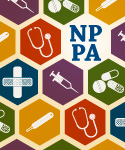October 19th, 2016
Fighting Decision Fatigue
Harrison Reed, PA-C
It was an impossible choice. The seconds ticked by, but no matter how I strained my mind, I could not find a solution. She sighed and asked again.
“Harrison, where do you want to eat?”
I buried my face in my hands. How could this simple question stump a person who makes a hundred monumental choices each day, weighs a thousand variables, and carries the well-being of his patients on his shoulders? After ten hours of work without a proper meal, my hunger alone should have made it an automatic selection.
Our car made another lazy loop around the parking lot.
Tacos. Or ramen. Or Thai food? There’s sushi or burgers. Pizza is pretty bad for you. I already had a salad today, though. Wait, did I have a salad today? There’s that Greek place. How late is the barbecue restaurant open? I should buy groceries and cook. But what should I cook?
“I just… I just don’t know.” I held my head as if my liquefied brain threatened to spill out. Maybe this was my breaking point. Maybe I would starve, a life snuffed out by radical indecision.
“Just drive,” I said. “Anywhere.”
I didn’t know it at the time, but my gustatory conundrum was actually a symptom of decision fatigue. Like physical fatigue, decision fatigue is the gradual depletion of one’s power to make decisions through overuse. My inability to choose a meal after a shift at the hospital might seem trivial, but the principle has very real consequences.
The most famous example of high-stakes decision fatigue comes from a study that examined the decisions of parole boards at Israeli prisons. Researchers found that judges were far more likely to issue favorable decisions to prisoners seeking parole if the cases were heard early in the day. The likelihood of a favorable judgment declined with each subsequent case but improved after a break for food or rest. It seemed that for those seeking mercy from the court, timing was everything.
Decision fatigue plays a major role in medicine, too. Unlike the Israeli judges, we are not just making a handful of decisions before lunch. Our unique environment means that, in some cases, we might make dozens of decisions per patient at a pace we do not truly control. If even minor decisions can deplete mental reserve, the potential for complete decision exhaustion is astronomical.
It appears we do not need to be physically exhausted for our mental stamina to wane. That means decision fatigue can consume us without overt signs. Since consequences can be dire for patients seen late in a shift, it is paramount that we acknowledge the threat and monitor our state of mind. While some degree of decision fatigue is unavoidable, there are strategies that can reduce the burden.
- Delegate Decisions
If mental fatigue results from an accumulation of decisions, the best defense is to reduce the number of those decisions. I have the luxury of working with great nurses who spend more time at the bedside than I do and have extensive insight into patients’ conditions. If two choices are medically equal in my mind and without contraindications, I can defer the final decision to the patient’s nurse. Pharmacists, nutritionists, speech pathologists, and physical therapists (among many others) are also great resources to reduce decision burden. As long as the team has a unified plan, the path to achieve it may be a matter of style or preference.
- Decide and Commit
Once all necessary information is available, make the decision. If no new data are coming, putting off a decision will only increase the toll it takes on your mental reserve. Make a choice and stick to it knowing you can always reassess when new information is available.
- Plan in Advance
Have a contingency plan in place for likely outcomes or complications. Make your decision ahead of time—under less stress—so your plan is clear should an urgent need arise. If appropriate protocols exist at your institution, use them rather than trying to reinvent a solution on the fly.
- Take a Break
When a break from the action is possible, take the opportunity. Strong evidence suggests that being tired or hungry makes decisions harder. A break with or without a meal is likely to improve decision fatigue.
As with most problems, recognition and acknowledgement of decision fatigue is the first step in overcoming it. Discuss this issue with your team and formulate strategies to reduce it. Or don’t. The choice, of course, is yours.
Please share your experiences and solutions or tips to combat decision fatigue.



All your ideas are smart, although some may verge on the draconian! Decide and commit! Might I suggest involving the patient in decision-making? Could make your life infinitely less fatigue-y. And decisions can be shared!
Involving the patient is a great tip to help relieve the burden of decision fatigue. Open discussion about treatment options is always important; just take great care to be fair in how you present options to patients. I did this much more in my ED practice than in my ICU practice. Having conscious and verbal patients is a great help.
Thanks for your input!
Take the team for a coffee
Thank you for this interesting point. Sometimes talking (outloud) about it with collegues makes the decision clearer by itself as it forces to objectively describe a medical situation/dilemma.
Best Regards,
MJ